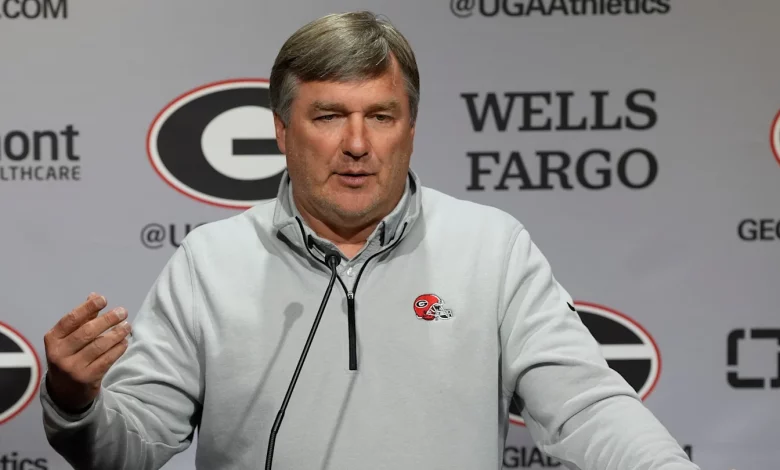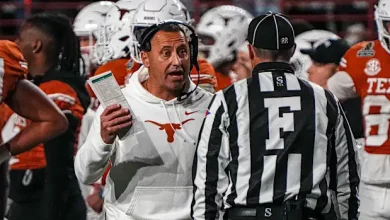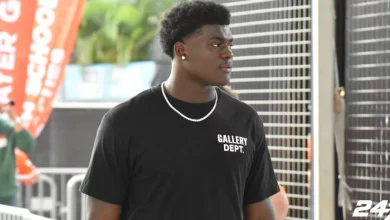Kirby Smart expressed concerns about the current model, stating that he’s unsure if kids are winning under it.

Kirby Smart, the head coach of the University of Georgia Bulldogs, is well-known for his leadership on the football field. Under his guidance, Georgia has become one of the most dominant programs in college football. With multiple SEC championships and a national title, Smart’s expertise on coaching and winning is undisputed. However, recently, he has expressed concerns about the current model of college athletics, particularly regarding how it impacts student-athletes. Smart’s statement, “I don’t know that the kids win in this model that we currently have,” has sparked a broad conversation about the evolving nature of college sports, the rise of NIL (Name, Image, and Likeness) deals, and the potential consequences for young athletes. This article will explore Smart’s concerns and the broader issues surrounding the current landscape of college football and athletics.
The Rise of NIL and the Changing Landscape of College Athletics
One of the most significant changes to college sports in recent years has been the introduction of NIL rights. Beginning in 2021, the NCAA allowed college athletes to profit from their name, image, and likeness, opening the door for student-athletes to sign endorsement deals, partner with companies, and earn money while still in college. While NIL has been praised for giving athletes the opportunity to benefit from their popularity and talents, it has also raised several concerns.
For many, NIL deals have become a central part of college sports. Large schools with deep-pocketed boosters can offer substantial financial incentives to athletes, leading to a more competitive environment off the field as well as on it. Some argue that this has shifted the focus of college athletics away from the student-athlete experience and towards a more professional model. Coaches, like Kirby Smart, have raised concerns about how this model impacts the overall well-being of athletes, particularly the younger ones who may not be equipped to handle the pressures of such attention and financial opportunities.
Kirby Smart’s Concerns: A Personal Perspective
Kirby Smart’s concerns about the current college athletics model are rooted in his deep understanding of the challenges facing student-athletes. In his statement, Smart expressed doubt about whether the current system is truly benefiting the athletes who are at the center of it all. As a coach who works closely with young people, he has seen firsthand how the pressures of high-level competition can impact players on and off the field.
Smart’s concerns are not just about the financial implications of NIL but also about how the changing dynamics affect the mental and emotional well-being of athletes. For many college football players, the pressure to succeed and perform at a high level is intense. Adding financial incentives to the equation can exacerbate these pressures, leading to distractions, unrealistic expectations, and potentially negative mental health outcomes.
Financial Pressures and Distractions
The financial opportunities brought by NIL deals can have both positive and negative effects on student-athletes. On the one hand, athletes can earn significant sums of money that may help them support their families or invest in their future. On the other hand, the pressure to manage these deals can be overwhelming, especially for younger athletes who may not have the experience or support system to handle such responsibility.
Smart has been vocal about the risk of athletes becoming distracted by financial opportunities rather than focusing on their development as football players and students. The influx of money from NIL deals has created a competitive environment in which athletes may feel pressured to sign with certain schools or engage in endorsement deals even if they are not fully ready for the added responsibility. In some cases, this has led to the devaluation of the college experience, as athletes become more focused on financial gain rather than personal growth and education.
The Pressure of Living Up to Expectations
Another concern Smart has raised is the intense pressure placed on student-athletes to live up to expectations—both on the field and in terms of their financial worth. Many college athletes, particularly those who are highly recruited or have lucrative NIL deals, are under constant scrutiny. The expectations placed on them to perform at an elite level can take a toll on their mental and emotional well-being.
The increasing involvement of boosters and corporate sponsors in college sports can further compound this pressure. Athletes who are offered significant NIL deals often feel the weight of their contracts, especially if their performance doesn’t meet expectations. This is a reality that many young athletes are not fully prepared for, which raises concerns about the long-term effects on their mental health and overall development.
The Impact on Team Dynamics and College Football Programs
Smart’s concerns are not just limited to individual athletes. He also sees potential negative consequences for the overall dynamics of college football teams and programs. The rise of NIL deals has created a system in which top players can often command huge sums of money, creating disparities within teams. Players may feel more isolated from their teammates, especially if they are receiving significantly larger deals than others. This can lead to friction within locker rooms, where unity and teamwork are essential for success.
Additionally, the introduction of NIL has made recruiting more complex. Coaches now have to factor in potential NIL opportunities when recruiting players, which can influence where athletes choose to commit. This has created a situation where some players are prioritizing financial opportunities over the overall fit with a program, potentially altering the culture of college football teams.
For coaches like Kirby Smart, managing a team of athletes with varying levels of financial compensation and external attention presents a unique challenge. Smart has built a successful program at Georgia based on teamwork, discipline, and a focus on development both on and off the field. The current college athletics model, with its emphasis on financial gain, threatens to undermine these core values. It risks turning college football into more of a business than a developmental platform for young athletes.
The Role of the NCAA and Potential Solutions
As the conversation around NIL continues to evolve, many are questioning the role of the NCAA in regulating these new changes. The NCAA’s decision to allow NIL deals was met with both praise and skepticism, and the organization is still grappling with how to manage the increasing commercialization of college sports. Coaches like Kirby Smart are calling for better regulation and oversight to ensure that the well-being of student-athletes remains a priority.
One potential solution is to establish clearer guidelines for NIL deals, ensuring that athletes are not exploited or pressured into deals that may not be in their best interest. There is also a growing call for more financial education and support for student-athletes, helping them navigate the complexities of NIL deals and ensuring they have the tools to make informed decisions.
Moreover, Smart has suggested that college athletics should return to a model where the focus is primarily on education and personal development. While NIL has brought financial opportunities to athletes, it is crucial that these opportunities do not overshadow the value of earning a college degree and growing as an individual. In Smart’s view, college athletics should continue to provide young athletes with the tools and resources they need to succeed both on the field and in life.
The Future of College Football: Balancing Business and Athlete Well-Being
The future of college football and college athletics, in general, is uncertain. The increasing commercialization of the sport, fueled by NIL and media deals, has made it more lucrative than ever before. However, it has also raised important questions about the well-being of athletes and the true purpose of college athletics.
Kirby Smart’s concerns about the current model serve as a reminder that the focus of college football should not solely be on financial gain and winning championships. While these are important aspects of the sport, it is equally important to ensure that the student-athletes who participate in these programs are supported in their personal growth, education, and mental health. Coaches, administrators, and policymakers must find a way to balance the growing business of college football with the fundamental values that make the sport a unique and valuable experience for young athletes.
In the end, Smart’s statement reflects a broader issue in the world of college athletics. As the model continues to evolve, it is crucial that the voices of those who work closely with student-athletes—coaches like Smart—are heard. They understand the challenges that young athletes face and can provide valuable insight into how to build a system that truly benefits the kids at the center of it all.









